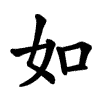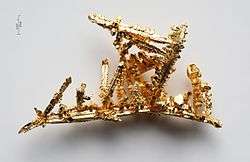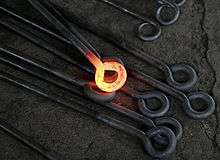Definify.com
Definition 2026
金
金
Translingual
| Stroke order | |||
|---|---|---|---|

| |||
Alternative forms
Han character
金 (radical 167 金+0, 8 strokes, cangjie input 金 (C), four-corner 80109)
- Kangxi radical #167, ⾦ (“gold”).
Derived characters
- Index:Chinese radical/金
- 𠊄
References
- KangXi: page 1295, character 1
- Dai Kanwa Jiten: character 40152
- Dae Jaweon: page 1795, character 13
- Hanyu Da Zidian: volume 6, page 4167, character 1
- Unihan data for U+91D1
Chinese
|
simp. and trad. |
金 | |
|---|---|---|
| alt. forms | 𠊍 | |
Glyph origin
| Historical forms of the character 金
| |||
|---|---|---|---|
| Oracle bone script | Bronze inscriptions | Large seal script | Small seal script |
 |
 |
 |
 |
| Characters in the same phonetic series (金) (Zhengzhang, 2003) | |
|---|---|
| Old Chinese | |
| 淦 | *kɯːm, *kɯːms |
| 顉 | *ŋɯːmʔ, *ŋ̥ʰrɯm, *ŋ̥ʰɯmʔ |
| 金 | *krɯm |
| 錦 | *krɯmʔ |
| 欽 | *kʰrɯm |
| 菳 | *kʰrɯm |
| 嶔 | *kʰrɯm |
| 撳 | *kʰrɯms |
| 捦 | *ɡrɯm |
| 鵭 | *ɡrɯm |
| 唫 | *ɡrɯmʔ, *ŋɡrɯm |
| 鈙 | *ɡrɯms |
| 崟 | *ŋɡrɯm |
| 趛 | *ŋɡrɯmʔ |
Phono-semantic compound (形聲, OC *krɯm) : semantic 王 (“upside-down axe”) + semantic 呂 (“two blocks of metal”) + phonetic 亼. 亼 is the ancient form for 今 (OC *krɯm).
Etymology
“Copper” [prior to 5th BCE] > “metals in general” > “gold”.
The main senses now are “gold” and “metal”.
Pronunciation
- Mandarin
- Cantonese (Jyutping): gam1
- Hakka (Sixian, PFS): kîm
- Min Dong (BUC): gĭng
- Min Nan (POJ): kim
- Wu (Wiktionary): jin (T1)
- Mandarin
- (Standard Chinese, Beijing)+
- Pinyin:
- Zhuyin: ㄐㄧㄣ
- Wade-Giles: chin1
- Gwoyeu Romatzyh: jin
- IPA (key): /t͡ɕin⁵⁵/
- (Standard Chinese, Beijing)+
- Cantonese
- (Standard Cantonese, Guangzhou)+
- Jyutping: gam1
- Yale: gām
- Cantonese Pinyin: gam1
- IPA (key): /kɐm⁵⁵/
- (Standard Cantonese, Guangzhou)+
- Hakka
- (Sixian, incl. Miaoli and Meinong)
- Pha̍k-fa-sṳ: kîm
- Hakka Romanization System: gim´
- Hagfa Pinyim: gim1
- IPA: /kim²⁴/
- (Sixian, incl. Miaoli and Meinong)
- Min Dong
- (Fuzhou)
- Bàng-uâ-cê: gĭng
- IPA (key): /kiŋ⁵⁵/
- (Fuzhou)
- Min Nan
- (Hokkien)
- Pe̍h-ōe-jī: kim
- Tâi-lô: kim
- Phofsit Daibuun: kym
- IPA (Xiamen): /kim⁴⁴/
- IPA (Quanzhou): /kim³³/
- IPA (Zhangzhou): /kim⁴⁴/
- IPA (Taipei): /kim⁴⁴/
- IPA (Kaohsiung): /kim⁴⁴/
- (Hokkien)
- Wu
- (Shanghainese)
- Wiktionary: jin (T1)
- IPA (key): /t͡ɕɪɲ⁵³/
- (Shanghainese)
- Dialectal data▼
| Variety | Location | 金 |
|---|---|---|
| Mandarin | Beijing | /t͡ɕin⁵⁵/ |
| Harbin | /t͡ɕin⁴⁴/ | |
| Tianjin | /t͡ɕin²¹/ | |
| Jinan | /t͡ɕiẽ²¹³/ | |
| Qingdao | /t͡ɕiə̃²¹³/ | |
| Zhengzhou | /t͡ɕin²⁴/ | |
| Xi'an | /t͡ɕiẽ²¹/ | |
| Xining | /t͡ɕiə̃⁴⁴/ | |
| Yinchuan | /t͡ɕiŋ⁴⁴/ | |
| Lanzhou | /t͡ɕĩn³¹/ | |
| Ürümqi | /t͡ɕiŋ⁴⁴/ | |
| Wuhan | /t͡ɕin⁵⁵/ | |
| Chengdu | /t͡ɕin⁵⁵/ | |
| Guiyang | /t͡ɕin⁵⁵/ | |
| Kunming | /t͡ɕĩ⁴⁴/ | |
| Nanjing | /t͡ɕin³¹/ | |
| Hefei | /t͡ɕin²¹/ | |
| Jin | Taiyuan | /t͡ɕiəŋ¹¹/ |
| Pingyao | /t͡ɕiŋ¹³/ | |
| Hohhot | /t͡ɕĩŋ³¹/ | |
| Wu | Shanghai | /t͡ɕiŋ⁵³/ |
| Suzhou | /t͡ɕin⁵⁵/ | |
| Hangzhou | /t͡ɕin³³/ | |
| Wenzhou | /t͡ɕaŋ³³/ | |
| Hui | Shexian | /t͡ɕiʌ̃³¹/ |
| Tunxi | /t͡ɕin¹¹/ | |
| Xiang | Changsha | /t͡ɕin³³/ |
| Xiangtan | /t͡ɕin³³/ | |
| Gan | Nanchang | /t͡ɕin⁴²/ |
| Hakka | Meixian | /kim⁴⁴/ |
| Taoyuan | /kim²⁴/ | |
| Cantonese | Guangzhou | /kɐm⁵³/ |
| Nanning | /kɐm⁵⁵/ | |
| Hong Kong | /kɐm⁵⁵/ | |
| Min | Xiamen (Min Nan) | /kim⁵⁵/ |
| Fuzhou (Min Dong) | /kiŋ⁴⁴/ | |
| Jian'ou (Min Bei) | /keiŋ⁵⁴/ | |
| Shantou (Min Nan) | /kim³³/ | |
| Haikou (Min Nan) | /kim²³/ |
| Rime | |
|---|---|
| Character | 金 |
| Reading # | 1/1 |
| Initial (聲) | 見 (28) |
| Final (韻) | 侵 (140) |
| Tone (調) | Level (Ø) |
| Openness (開合) | Open |
| Division (等) | Chongniu III |
| Fanqie | 居吟切 |
| Reconstructions | |
| Zhengzhang Shangfang |
/kˠiɪm/ |
| Pan Wuyun |
/kᵚim/ |
| Shao Rongfen |
/kiem/ |
| Edwin Pulleyblank |
/kjim/ |
| Li Rong |
/kjəm/ |
| Wang Li |
/kĭĕm/ |
| Bernard Karlgren |
/ki̯əm/ |
| Expected Mandarin Reflex |
jīn |
| Baxter-Sagart system 1.1 (2014) | |
|---|---|
| Character | 金 |
| Reading # | 1/1 |
| Modern Beijing (Pinyin) |
jīn |
| Middle Chinese |
‹ kim › |
| Old Chinese |
/*k(r)[ə]m/ |
| English | metal, bronze |
Notes for Old Chinese notations in the Baxter-Sagart system: * Parentheses "()" indicate uncertain presence; | |
| Zhengzhang system (2003) | |
|---|---|
| Character | 金 |
| Reading # | 1/1 |
| No. | 6679 |
| Phonetic component |
金 |
| Rime group |
侵 |
| Rime subdivision |
1 |
| Corresponding MC rime |
金 |
| Old Chinese |
/*krɯm/ |
| Notes | 說文今聲,俞敏依金文非之 |
Definitions
金
- †copper (Cu)
- metal
- 合金 ― héjīn ― alloy
- metalware
- gold (Au)
- golden; blond
- (by extension) money; material wealth
- (historical) ancient currency unit
- (historical) gong or other metalware for signalling commands in the military
- †(figuratively) sun
- †(figuratively) moon
- †(figuratively) respectful; noble; rich
- †(figuratively) impregnable
- †(figuratively) imperial
- †(figuratively, of voice) beautiful; wonderful
- Short for 金星 (Jīnxīng, “Venus”).
- Short for 金朝 (Jīncháo, “Jurchen Jin dynasty (1115–1234)”).
- A surname.
Compounds
|
|
|
Descendants
Japanese
Kanji
| Chemical element | |
|---|---|
| Au | Previous: 白金 (hakkin) (Pt) |
| Next: 水銀 (suigin) (Hg) | |


金 (kane, kana, kin): Metal in general, such as metal sheeting.
|

|
Readings
- Goon: こん (kon)
- Kan’on: きん (kin)
- Kun: かな (kana), かね (kane), くがね (kugane) (rare), こがね (kogane) (rare)
- Nanori: か (ka), かん (kan), きむ (kimu), こ (ko), この (kono)
Etymology 1
| Kanji in this term |
|---|
| 金 |
|
かな Grade: 1 |
| kun'yomi |
From Old Japanese. Appears to be the older form of this word. In modern Japanese, only found at the start of compounds.
Pronunciation
Prefix
金 (hiragana かな, romaji kana-)
Derived terms
|
Etymology 2
| Kanji in this term |
|---|
| 金 |
|
かね Grade: 1 |
| kun'yomi |
Appears to be a fusion of kana + Old Japanese emphatic nominal particle い (i). Compare the development of modern kami from kamu + i at 神, te from ta + i at 手, me from ma + i at 目, kaze from kaza + i at 風.
/kana/ + /i/ → /*kanai/ → /kane/
The four kanji spellings of this term, 金 (“gold”), 銀 (“silver”), 銅 (“copper”), and 鉄 (“iron”), hint at the importance of each of these four metals in ancient Japan.
Pronunciation
Alternative forms
Noun
Usage notes
The 金 spelling is the most common for this term.
Synonyms
Derived terms
Etymology 3
| Kanji in this term |
|---|
| 金 |
|
くがね Grade: 1 |
| kun'yomi |
Compound of 黄 (ku, “yellow”) + 金 (kane, “metal”). The ku is a variation of regular kun'yomi of ki for the 黄 character.[3]The kane changes to gane as an instance of rendaku (連濁).
Pronunciation
Alternative forms
Noun
金 (hiragana くがね, romaji kugane)
- (archaic) gold
Etymology 4
| Kanji in this term |
|---|
| 金 |
|
こがね Grade: 1 |
| kun'yomi |
/kugane/ → /kogane/
Alteration of kugane[3], possibly influenced by metaphor from 小金 (kogane, “a small amount of money”), or by the kan'on reading of kō for the 黄 character.
Pronunciation
- Kun'yomi
- (Tokyo) こがね [kògáné] (Heiban - [0])[1][2]
- (Tokyo) こがね [kóꜜgànè] (Atamadaka - [1])[2]
- IPA(key): [ko̞ɡ̃ã̠ne̞]
Alternative forms
Noun
金 (hiragana こがね, romaji kogane)
- gold
- gold or metal currency: coins, such as 大判 (ōban) or 小判 (koban)
- short for 黄金色 (kogane iro, “gold”, the color)
- short for 黄金の泥 (kogane no dei, “golden mud”, gold dust suspended in an emulsion and used for painting or other decoration)
- ⇒ 金泥 (kondei)
See also
- 小金 (kogane): a small amount of money
- 金泥 (kondei): “golden mud”, gold dust suspended in an emulsion and used for painting or other decoration
Etymology 5
| Kanji in this term |
|---|
| 金 |
|
きん Grade: 1 |
| on'yomi |
From Middle Chinese 金 (/kim/). Compare modern Mandarin 金 (jīn).
Pronunciation
Noun
- gold (Au)
- money
- 金一封をもらった。
- Kin ippū o moratta.
- I received a gift of money.
- 金一封をもらった。
- metal
- (shogi) short for 金将 (kinsho, “the gold general”, a shogi piece)
- one of the five classical elements in traditional Chinese philosophy and medicine: see the "Wu Xing" entry on Wikipedia
Usage notes
Often found in compounds.
Derived terms
|
Proper noun
Etymology 6
| Kanji in this term |
|---|
| 金 |
|
こん Grade: 1 |
| on'yomi |
From Middle Chinese 金 (/kim/).
Pronunciation
Noun
- one of the five classical elements in traditional Chinese philosophy and medicine: see the "Wu Xing" entry on Wikipedia
References
- 1 2 3 4 2006, 大辞林 (Daijirin), Third Edition (in Japanese), Tōkyō: Sanseidō, ISBN 4-385-13905-9
- 1 2 3 4 1998, NHK日本語発音アクセント辞典 (NHK Japanese Pronunciation Accent Dictionary) (in Japanese), Tōkyō: NHK, ISBN 978-4-14-011112-3
- 1 2 1988, 国語大辞典(新装版) (Kokugo Dai Jiten, Revised Edition) (in Japanese), Tōkyō: Shogakukan